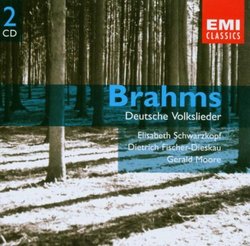| All Artists: Elisabeth Schwarzkopf, Dietrich Fischer-Dieskau, Gerald Moore, Johannes Brahms Title: Brahms: Deutsche Volkslieder; Elisabeth Schwarzkopf; Dietrich Fischer-Dieskau Members Wishing: 0 Total Copies: 0 Label: EMI Classics Release Date: 6/1/2004 Album Type: Original recording remastered Genres: Folk, Pop, Classical Styles: Vocal Pop, Opera & Classical Vocal, Historical Periods, Modern, 20th, & 21st Century Number of Discs: 2 SwapaCD Credits: 2 UPC: 724358550221 |
Search - Elisabeth Schwarzkopf, Dietrich Fischer-Dieskau, Gerald Moore :: Brahms: Deutsche Volkslieder; Elisabeth Schwarzkopf; Dietrich Fischer-Dieskau
 | Elisabeth Schwarzkopf, Dietrich Fischer-Dieskau, Gerald Moore Brahms: Deutsche Volkslieder; Elisabeth Schwarzkopf; Dietrich Fischer-Dieskau Genres: Folk, Pop, Classical
|
Larger Image |
CD Details |
CD ReviewsSongs for Intimate Evenings Robin Friedman | Washington, D.C. United States | 11/04/2004 (5 out of 5 stars) "These songs, Brahms's German Folksongs, are a collection of intimate, romantic music for voice and piano. They are full of lyricism and center on timeless themes of love and loss. Brahms published the songs in 1894, late in his life, without an opus number. The songs were intended for domestic music-making rather than public performance. The songs are performed here by Dietrich Fischer-Dieskau, baritone, Elizabeth Schwarzkopf, soprano, and Gerald Moore, piano. One could hardly ask for more. Brahms was a collector of folksongs for much of his life and a revival of German nationalism in music was among his goals in this collection. But Brahms took his work from a variety of sources. Although he used some authentic folk material, he also used composed collections of songs and collections intended to parody the interest in folk music in the audience of his day. (In the way in which Tom Leherer, for example, tried to parody the interest in folk music in the United States in the 1960s.) No matter. Brahms simply took the music he loved and set it. The songs are thus a combination of folk music, lieder, and parlor music fused together by Brahms's creativity. In listening to these songs, I thought of the Irish-Scottish folksong settings which occupied Beethoven during his later years. Beethoven's settings, however, were done on commission. Delightful as they are, they don't flow from a personal drive to record and set folksongs (or alleged folksongs), as does Brahms's collection. In his 1990 study of Brahms, Malcolm McDonald aptly describes the German Folksongs as returning "to a world of gallant knights, deserted maidens, enchanted fiddlers, repentant nuns, lovers both sad and happy, and death the Reaper -- an idealized medieval world, fit for the dreams of Young Kreisler." (Quoted in Jan Swafford, "Johannes Brahms a Biography at 595) All of these songs are simple and accessible in stanzaic, strophic form. They are all short. Some of these songs are for solo male voice, others for solo female voice, and others for both. Interestingly, the two voices never sing together in this collection. Typically there is a stanza for one singer, a piano interlude, and a stanza for the other singer -- never both together. The piano part adds immeasurably to these songs in its short interludes and postludes and in its accompaniment. (There are only a handful of preludes for the piano in this collection.) Fisher-Dieskau, Schwarzkopf and Moore perform with love and feeling. The program notes for this reissue are sparse and the texts of the songs are not provided. Brahms made significant alterations to his texts and, in general, was less concerned with matching text to melody than other composers of lieder. These songs communicate through their music. This is a collection that will bring joy to any lover of song." Lovely Brahms Critic at large | East Coast USA | 09/20/2005 (5 out of 5 stars) "This would get seven stars if it were up to me. I only tend to review recordings that are in my opinion very good, or very bad. This is one of the good ones! Elisabeth Schwarzkopf and Dietrich Fischer-Dieskau! One could not ask for a better pair of lieder singers. Pianist Gerald Moore is a real pro and artist in his own right, able to contribute to and frame the vocal art exquisitely. I must admit I have a soft-spot for Brahms and musically astute native speakers singing lieder, and this certainly fits the bill. However, even if you don't understand a word of German, you can just close your eyes and enjoy. Listening to this recording is almost the same as having been invited into a parlor with the three artists for an intelligent evening of house music! If you love German lieder you MUST own this recording. If that isn't enough reason to buy it, the price for the 2 CD set makes it a worthwhile purchase for a serious collector on a budget." Many of the great melodies of the world are here. John Austin | Kangaroo Ground, Australia | 07/04/2004 (5 out of 5 stars) "Lieder recitals seem to feature less and less often in concert schedules these days. For devotees, therefore, recourse to the many peerless recordings made by lieder singers of the past provides easy compensation. Many such singers carried a sense of conviction in what they were singing and a familiarity with the great Romantic ethos that lie outside the range of contemporary exponents. Two such lieder singers, happily still with us, are Elisabeth Schwarzkopf and Dietrich Fischer-Dieskau. Sometimes joined by doyen of accompanists (as here) Gerald Moore, they enriched the catalogues with countless recordings of German lieder. One of the projects in which they all combined was this 1966 recording of Brahms' complete Deutsche Volkslieder. In its day, this recording satisfied on all counts; in this new remastered format, it sounds even better. Many of the great melodies of the world are to be heard here. Perhaps the loveliest of all is the last of this collection - In stiller Nacht. Some might argue, however, that Brahms' provides a piano accompaniment that masks rather than enhances its perfection."
|

 Track Listings (21) - Disc #1
Track Listings (21) - Disc #1